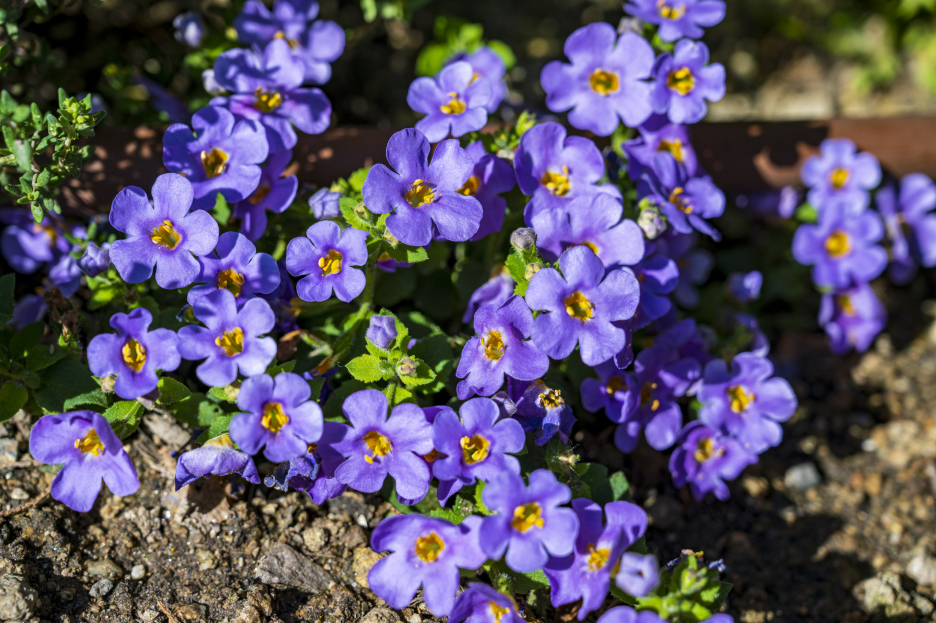
Bacopa, also known by its botanical name Sutera cordata, is a charming and versatile plant that is widely loved for its trailing growth habit and delicate, colorful flowers. Whether you are growing it as a ground cover, in hanging baskets, or as a container plant, Bacopa adds a cheerful touch to your garden or home. It is relatively easy to care for, making it a great choice for both novice and experienced gardeners. Here's everything you need to know about caring for Bacopa.
Bacopa plants thrive in bright, indirect light but can tolerate some direct sunlight. Ideally, place your Bacopa in a location where it receives at least 4-6 hours of sunlight per day. If growing it indoors, a bright window with filtered light will work well. If growing Bacopa outdoors, choose a spot with morning sun and afternoon shade, especially in regions with hot summers, to prevent the plant from getting scorched.
If your Bacopa isn’t flowering as expected, it could be due to insufficient light. Ensure it’s getting enough exposure to sunlight, as Bacopa requires light to bloom.
Bacopa plants prefer well-draining soil that is rich in organic matter. A general-purpose potting mix works well for Bacopa, but if you're growing it in a garden, you can improve the soil’s drainage by adding compost or sand. Bacopa enjoys slightly acidic to neutral soil, with a pH level between 6.0 and 7.0.
If planting in containers, ensure that your pots have drainage holes to prevent water from accumulating at the bottom, as Bacopa does not tolerate soggy conditions. Good drainage is essential for healthy root development.
Bacopa plants like to be kept moist but not waterlogged. Water your Bacopa when the top inch of soil feels dry to the touch. In hot weather or during the growing season, Bacopa may require more frequent watering, but it’s important not to let the plant sit in water for extended periods. If growing in containers, be sure the pot drains well to prevent root rot.
It’s a good idea to water your Bacopa early in the day to give it time to dry off before evening, as wet foliage overnight can encourage fungal diseases. If you notice yellowing leaves or wilting, it could be a sign of overwatering, so make sure the soil has good drainage.
Bacopa plants thrive in moderate to warm temperatures, typically between 60°F and 75°F (15°C to 24°C). They can tolerate slightly cooler temperatures but should be protected from frost, as they are sensitive to cold. If growing Bacopa outdoors, make sure to plant it after the last frost of the season and bring it indoors when temperatures drop below 50°F (10°C).
Bacopa also enjoys moderate humidity. If growing indoors, it will appreciate a bit of extra moisture in the air, especially in dry environments. You can increase humidity by misting the plant occasionally or using a room humidifier. However, Bacopa is fairly adaptable and can tolerate average indoor humidity levels.
To encourage healthy growth and vibrant blooms, Bacopa benefits from regular feeding during the growing season (spring through summer). Use a balanced liquid fertilizer or a slow-release fertilizer that’s designed for flowering plants. Fertilize every 4-6 weeks, but be sure to dilute the fertilizer to about half the recommended strength to avoid overfeeding.
During the winter months, Bacopa typically enters a dormant phase and does not need fertilizing. Cutting back on fertilization during this time will help the plant rest and conserve energy for the next growing season.
Bacopa is a trailing plant, so regular pruning will help maintain its shape and encourage more blooms. To keep your plant looking tidy, remove any dead or yellowing leaves and spent flowers. If Bacopa becomes too leggy or overgrown, you can trim back the stems to promote bushier growth and prevent the plant from becoming too unruly.
Pinching back the tips of the stems will encourage branching, leading to a fuller, more compact plant. This is especially important if you are growing Bacopa in hanging baskets or containers, as it helps the plant maintain a bushy, cascading appearance.
Bacopa is generally resistant to pests, but it can occasionally attract aphids, whiteflies, or spider mites. If you notice small insects on the plant or see discolored spots on the leaves, treat the plant with insecticidal soap or neem oil. Always test any treatment on a small portion of the plant first to ensure it doesn’t cause damage.
Bacopa is also susceptible to fungal diseases, particularly in humid environments with poor air circulation. To prevent issues like powdery mildew, avoid overhead watering and ensure that the plant has good airflow around it.
Yes, Bacopa plants are considered non-toxic to pets. They are safe to have around cats, dogs, and other pets. However, as with all plants, it’s best to keep them out of reach of curious animals to avoid any potential damage to the plant.